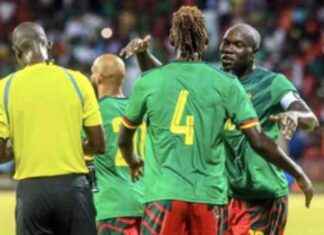Several hundred refugees fleeing Nagorno Karabakh entered Armenia on Sunday, which implicitly criticized Russia for its lack of support after the victory of the Azerbaijani army against the separatists of this territory mainly populated by Armenians.
“The external security systems in which Armenia is involved have proven ineffective in protecting its security and interests,” insisted Armenian Prime Minister Nikol Pashinian in a televised speech.
An allusion to the long-standing relations that this Caucasian country maintains with Moscow, inherited from the time when it was part, like neighboring Azerbaijan, of the USSR.
In Yerevan, the Armenian capital, the opposition, demonstrating for the sixth day in a row, accused the Prime Minister of “deliberately destroying Armenia’s relations with its partners”, through the opponent Andranik Tevanyan. addressing the crowd on Sunday evening.
A sign of the strong international impact of this crisis, Turkish President Recep Tayyip Erdogan will meet his Azerbaijani counterpart Ilham Aliev on Monday in the Azerbaijani enclave of Nakhichevan, nestled between Armenia and Iran.
Added to this is a long-planned meeting, on October 5 in Spain, between MM. Aliev and Pashinian, according to the Armenian authorities. It will take place in Granada, with French President Emmanuel Macron, German Chancellor Olaf Scholz and European Council President Charles Michel.
In the afternoon, the first residents of Nagorno Karabakh, including women, children and the elderly, arrived at the reception center set up by the Armenian government in Kornidzor, on the Armenian-Azerbaijani border.
According to the Armenian government, in total on Sunday evening, 377 “people forced to leave” crossed over to the Armenian side. According to the latest count from the Russian Defense Ministry, 311 civilians, including 102 children, were escorted by the Russian peacekeeping force on the Armenian side. “The Russian peacekeeping contingent ensures that it continues to accommodate 715 civilians, including 402 children,” while awaiting a solution.
The authorities of Nagorno Karabakh announced on Sunday that civilians left without housing due to the latest violence would be transferred to Armenia with the help of Russian peacekeepers, present there since the previous war, in 2020.
Azerbaijan, for its part, has undertaken to allow rebels who surrender their weapons to go to Armenia.
And it is through the same Kornidzor border crossing that 23 ambulances transporting “seriously injured citizens” accompanied by doctors and Red Cross employees must pass, said the Armenian Ministry of Health.
A man interviewed by AFP in Kornidzor said he had been part of the “resistance” until Azerbaijan’s assault forced the rebels to capitulate on Wednesday.
“Our families were in the shelters. We were in the army but yesterday we had to put down our rifles. So we left,” said this villager in his thirties who was waiting with others to be registered. in the reception center.
Many fear in this regard that the local population will flee en masse, at a time when Azerbaijani forces tighten their grip.
Because in addition to the anxiety that reigns among the approximately 120,000 inhabitants of Nagorno Karabakh, the humanitarian situation remains very tense.
Surrounded by Azerbaijani troops, its “capital”, Stepanakert, is deprived of electricity and fuel and its population lacks food and medicine, according to an AFP correspondent.
On Saturday, a first aid convoy from the International Committee of the Red Cross (ICRC) nevertheless entered Nagorno Karabakh, while, from the UN platform in New York, Armenia demanded the “immediate” shipment. of a United Nations mission, reiterating its accusations of “ethnic cleansing”.
Tension is high at the Kornidzor border post, where dozens of angry Armenians are seeking news of their loved ones, AFP noted. Wild rumors spread in the crowd and at one point a man even pulled out a knife.
“My son was in the army in Artsakh (Nagorny Karabakh). He is alive but I worry about him,” says a 43-year-old man.
He says he “hopes that armed groups will cross the border”. “If they do it, I will go with them to save my son” from this mountainous enclave attached in 1921 by Soviet power to Azerbaijan and which was in the past the scene of two wars: one in 1988 in 1994 (30,000 deaths) and the other in the fall of 2020 (6,500 deaths).
Illustration, on the Azerbaijani side, of the deep traces left by the tormented history of this region, in the town of Beylagan, very close to Nagorno Karabakh, a gallery of dozens of portraits of people killed three years ago or during the first conflict, flanked by Azerbaijani flags, line the main artery.
“I support” Baku’s ongoing operation to regain control of this secessionist territory, “our beautiful land has been liberated”, exclaims to an AFP journalist Famil Zalov, a farmer in his fifties of years.
“If you dig the soil of these mountains (…) you will find things, our grandfather’s woolen jacket, you will find our grandmother’s combs, but you will not find anything that belongs to the Armenians or the Russians,” assures Minaya Valieva, another resident.
But the conflict is not unanimous in Azerbaijan. “This week, five people were arrested in Azerbaijan for anti-war messages and four others for political activism,” Azerbaijani human rights activist Jala Bayramova reported on X (formerly Twitter) on Sunday. “All of them received sentences ranging from 30 days of imprisonment to two months of preventive detention,” she said.
burx-bds-dth/am
24/09/2023 19:13:51 – Kornidzor (Armenia) (AFP) – © 2023 AFP






